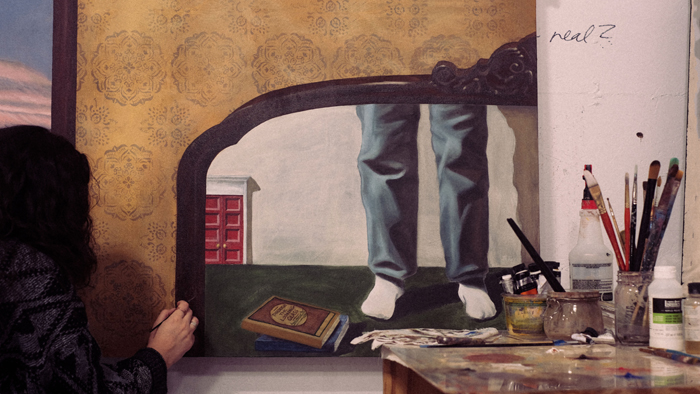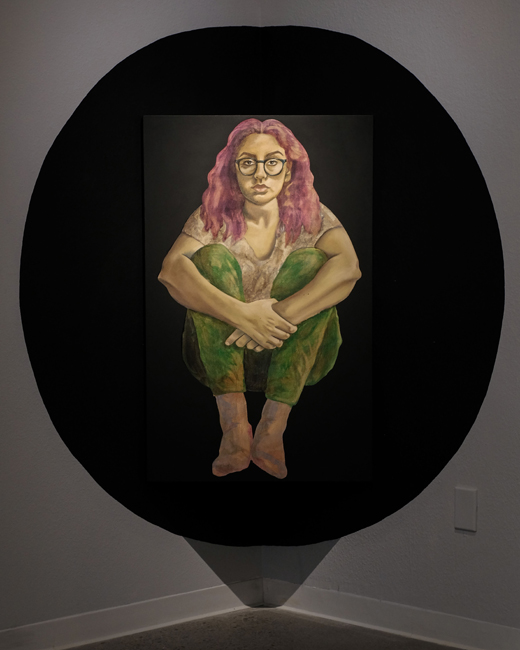In the debut article of our Financial Literacy for Artists series, Tamara Bates, founder of the dots between fellowship, explores financial building blocks for artists at the beginning of their careers.

Southwest Contemporary is excited to offer a new financial wellness for artists series. This summer, we will bring you financial content that can apply to artists working in any medium and at any career stage.
We are pleased to partner with Tamara Bates, founder of the Santa Fe-based dots between fellowship. Over the past three years, Bates has worked with hundreds of artists in the Southwest and across the country. Her articles will share information on the core topics she has been asked about, as well as what she learned as a financial advisor for UBS and Raymond James. The images in this series are all from previous dots between fellows.
SWC looks forward to providing future professional development articles tailored to your interests and needs. Drop us a line at editor@southwestcontemporary.com and let us know what areas are most important for you.
The columns in this series include:
- What You Need to Know as an Emerging Artist
- What Mid-Career Artists Need to Plan For
- What Late-Career Artists Need to Consider
- Basics of Managing Uneven Income
- Protective Factors for Managing Uneven Income
- Aligning Revenue, Time, and Values
- Student Loan Updates
- IRAs Explained
- 401(k) and 403(b) Employer Retirement Plans
- Sandwich Generation Financial Planning and Family Needs
Financial Lifespan of an Artist: What You Need to Know Coming Out of Art School or as an Emerging Artist
In this article, we will start with some of the factors important for getting your career started.
Knowing Your Non-Negotiable Expenses
One of the central factors for building your budget and accurate planning is knowing your “needs number.” This is the amount of your fixed expenses, money that you have to spend every month that is not flexible. This includes items you might expect—housing, food, utilities, transportation, clothing—and also items that might not be as obvious, such as medications you might be taking, your minimum student loan payment if you have one, and child care if you have children. Knowing this “needs” number will help you plan the minimum amount of income you need to take in each month.
When you are first starting out, you may want a part-time job to at least cover this needs number and grow your art business over time to cover more of your monthly budget. The other parts of your budget include “wants” like eating out, vacations, subscriptions, and “wishes” like extra art supplies, additional trainings or classes, or saving for a future property.
Another big factor to keep in mind is saving for future you—making sure you are putting money away to help meet your expenses in later age. Subsequent articles will delve into this topic in great detail. For now, we will just make a quick mention.
Knowing your needs number can also help you figure out how much to charge for your time/work if you are a full-time artist. Once you are clear about the minimum amount you need to make to cover all of your core costs, you can use that number to figure out your monthly, weekly, and hourly rates and how to charge for your time and work based on meeting that baseline amount plus the extras that round out your expenses.

The Importance of Building Credit
Building credit early in your career is an important step to making it possible to qualify for a future loan that you might need to grow your business or to purchase property. Your credit score is a number that lenders use to determine your trustworthiness in being able to repay money loaned. It’s kind of a chicken-and-egg scenario, where you aren’t deemed creditworthy unless you have taken on debt, and you can’t take on debt unless you have a good credit score. You can have a good credit score but not necessarily a credit history. I want to be clear that you need that credit history—a history of borrowing money and repaying.
I mention this topic because it’s an area I see a lot of artists avoiding—they don’t want to get into debt, which is smart. But not building a credit history can limit opportunities down the road you may want to qualify for. One idea is to take out a credit card or secured credit card to pay for an expense like gas and then pay it off each month. That way, you are not going into debt, but you are building a record of credit. This record of credit history is the way that you will qualify for the best loan rates for a car or mortgage or be able to refinance outstanding student loan debt.
Setting up Your Business Structure
It can be confusing to know what type of business structure you need to start with and the differences between them. For most individuals, setting up a single-member LLC will be enough. Single-member LLCs are still filed under your personal tax returns on Schedule C.
The main thing to establish from the beginning is a method for separating your personal and business expenses. Opening a standalone bank account for your art business will make it easier to track and have everything ready for tax time. Do file your taxes even if you don’t owe—you may get a refund for any taxes you have paid.
Also, many programs and grants use your tax history to qualify you. For example, Siler Yard Apartments, a Santa Fe affordable housing complex for artists, used tax returns as a way to qualify people to live there. Having a tax history will also be necessary when applying for a mortgage.
Conclusion
It can be stressful and overwhelming to tackle the financial and business side of your practice all at once. Try breaking things down into steps and take them one at a time. As your business grows, you will also learn more and be able to figure out your style and approach to these matters that feels most comfortable to you.
Further Resources
Visit your city’s economic development page to find resources on setting up a business.
A New Mexico example:
- Register on the New Mexico Secretary of State’s website, which walks you through the process.
- Get a “CRS” number from New Mexico Tax and Revenue.
- Check out the New Mexico-specific FAQs on registering as a business.
Disclaimer: This information is for educational purposes only and should not be construed as official financial, legal, or tax advice. Please seek specific advice for your situation from authorized individuals.




